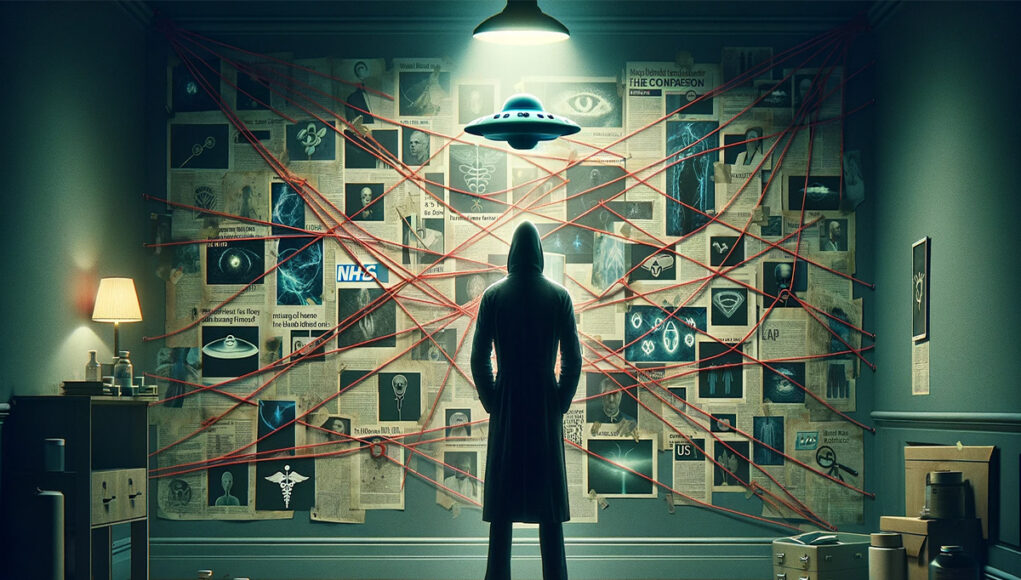How conspiracy theories can affect the communities they attack – new research.
Scientists have learned a lot about why people believe in conspiracy theories and how they harm society over the past couple of decades. Yet little is known about how the groups targeted by conspiracy theories feel and behave.
Written by Daniel Jolley, University of Nottingham; Andrew McNeill, Northumbria University, Newcastle, and Jenny Paterson, Northumbria University, Newcastle. This article is the opinion of the authors and not necessarily that of the UK Defence Journal. If you would like to submit your own article on this topic or any other, please see our submission guidelines.Â
Our new research found that conspiracy theories can make people from their target communities want to help and support each other. And we also found that popular conspiracy theories about groups of people can make them more fearful and distrustful of people from outside their group.
This means conspiracy theories probably do even more harm to society than people realise. Not only do they stoke up hatred against groups of people, but they also make it harder for the targets of conspiracy theories to feel that they can safely interact with people from outside their community.
Jewish people are often the targets of erroneous conspiracy beliefs. For example, for centuries, many conspiracy theories have centred around a belief that Jewish people have a secretive influence over world affairs.
Such beliefs are often widely shared on social media and are probably seen by and affect many who are part of the target group.
In our research, we wanted to look at the impact of shared conspiracy theories on the people they target. In a series of studies published in the British Journal of Psychology, we examined how Jewish people’s awareness of these conspiracy theories affected their emotions and behaviour.
Our previous research into the impact of hate crimes against the LGBTQ+ community found such attacks made them feel anxious, angry and suspicious of other people. So we expected that a perception that conspiracy beliefs against Jewish people are popular may lead to similar feelings of anxiety and a reluctance to interact with non-Jewish people.
Our first study, carried out in January 2020 with 250 predominately US Jewish participants, supported these hypotheses. We found that when participants rated Jewish conspiracy theories as popular among non-Jews, this was associated with them feeling more threatened. It was also associated with them being more likely to want to avoid contact with people outside of the Jewish community.
We followed this up in July 2020 with an experiment in which 210 US Jews read two different articles. Half of them read an article which claimed many non-Jewish people believe in Jewish conspiracy theories. The other half read an article which claimed only a few non-Jewish people believe in such conspiracy theories.
The first group reported feeling more threatened. These participants felt more anxious and believed that other Jews would feel anxious and angry, too.
We then examined how these emotions may affect intentions for contact with outsiders. Feelings of anxiety were associated with participants wanting to avoid contact with non-Jewish people. Our findings show how awareness of conspiracy theories can affect people’s emotions, particularly anxiety, and can even result in wanting to avoid contact with people outside the target group.
We repeated the news article experiment in a final study in July 2022 with 209 US Jewish participants, with similar results. These participants also reported that conspiracy theories pose a physical threat to Jewish people. This perception of threat, in turn, was again linked to feeling more angry and anxious.
In this study, however, we also asked participants if they would provide support to fellow Jews, a measure we call collective action. Participants who felt anxious also seemed more willing to join and increase participation in groups and charities that help Jewish people.
This final study also included a behavioural task. Participants were told that they had the option to chat with another participant who was non-Jewish. In reality, no interaction would occur, but it allowed us to see how participants would respond.
We found that participants who read that the article claiming that many non-Jewish people believe in Jewish conspiracy theories were more likely to avoid chatting with this hypothetical non-Jewish person.
New perspective
We can’t fully appreciate how conspiracy theories divide society unless we consider how the targets of these beliefs are affected. Not only do conspiracy theories stoke tensions between groups, but these beliefs can do a lot of emotional harm to people from targeted groups. This can make it harder for them to feel safe outside of their community.
We believe that help and support from within these communities by itself is not enough to tackle the emotional toll of conspiracy theories. Developing anxious feelings about encountering others who may believe these false ideas and beginning to avoid people outside one’s group could lead to other people perceiving the targeted group as insular. This could then reinforce erroneous conspiratorial beliefs.
Our findings are very unlikely to be isolated to the Jewish community. As conspiracy theories target many different groups – from healthcare workers and scientists, to entire social groups – these communities probably experience similar effects.
This means that when we think about how to tackle conspiracy beliefs, we need to think about how we support the people they target too. Increased positive contact between groups unaffected by conspiracy theories and groups affected by them may not only lead to reduced belief in conspiracy theories and more positive attitudes but could reduce the anxiety felt by affected groups about encounters with people from outside the community.
Such encounters could reassure groups affected by conspiracy theories that the numbers of people who believe conspiracy theories is lower than they anticipate, and they have more allies than they anticipate.![]()
Daniel Jolley, Assistant Professor in Social Psychology, University of Nottingham; Andrew McNeill, Assistant Professor in Psychology , Northumbria University, Newcastle, and Jenny Paterson, Assistant Professor in Psychology, Northumbria University, Newcastle
This article is republished from The Conversation under a Creative Commons license. Read the original article.














Mmm. Sadly when government lies? Conspiracy theories become the norm. Covid proved that. Media cannot be trusted. And the use of “nudge units”? Including an element from the army? Further reinforces suspicion in many. All amplified on social media. Funny the nudge unit was made up of “behavioural psychologists”……
Covid is real and has killed tens of thousands in the UK. Nudge theory is manipulative on one level, however sadly many people don’t respond to logical arguments. Instead they need to be directed to do the right thing (like not spreading a deadly virus around because they want a pint)
The individual has a right to decide for themselves. Government has no role in dictating. Employing a card carrying Communist Party member, using the Army as part of psychops? Has no place in a democracy. And mandating experimental, unproven therapies, which contravenes international law? A human rights abuse. If you cannot get your head around those concepts? Then I see no point is discussing the matter with you. Yes, the virus is real. Maybe people like you should be addressing the where, how and why it appeared question. Not swallowing propaganda from a group of psychologists who work for universities that are funded by foreign sources.
It’s great to see articles like this. Conspiracy theories spread lies and sow discord. Just think about the motivations of those who start and perpetuate those theories. This includes our adversaries, like Russia’s regime, who want us to be divided and ignorant